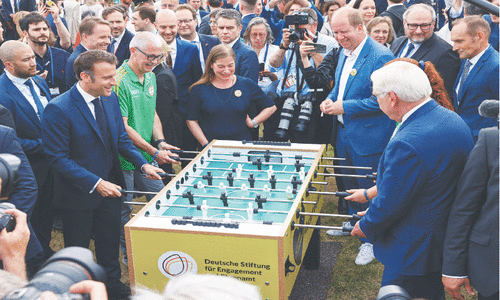LONDON: Senior military officers, defence officials and even ministers are making no secret of their view that British forces in Iraq are on a hiding to nothing, that their very presence is counterproductive. The British Army would like to sneak out without anyone noticing, leaving the south in the hands of Iranian-backed Shia militia.
Afghanistan, they say, is different. There, British troops are fighting for what ministers call a ‘noble cause’. But the problem, they now privately admit, is that the spiral of violence in Iraq is plainly being repeated in Afghanistan, albeit without the sectarian violence.
In one of the bloodiest days since the Taliban was overthrown in 2001, at least 24 people were killed on Sunday (June 17) by a suspected suicide bomber in the centre of Kabul and at least seven children were killed by US air strikes on a school near the Pakistan border. This week (June 20), the Agency Coordinating Body for Afghan Relief, Acbar, which represents nearly 100 aid and humanitarian organisations, roundly condemned foreign, particularly US, troops for the “disproportionate or indiscriminate use of force”.
As its influence grows inexorably in Iraq, Iran is now meddling increasingly in Afghanistan. As a result of British and US foreign policy, says a senior British official, “the Iranian Revolutionary Guards are on a roll”. Shortly before Sunday’s attack in Kabul, another well-placed senior British official commented: “One of the most damaging legacies of Iraq is the spreading of suicide bombings.” These officials have no agenda, certainly no political axe to grind. They are professionals whose job is to defend British interests and security from domestic and foreign threats. Their comments are therefore all the more telling.
British soldiers used to say they preferred gunfights with the Taliban in southern Afghanistan to the improvised explosive devices and sniper fire in southern Iraq. They are now facing the prospect of being at the receiving end of the Taliban’s shift away from open combat to the ‘asymmetric’ attacks familiar from Iraq.
Ministers describe Afghanistan as a noble cause because, they say, vital British interests are at stake – the country cannot be allowed to become a failed state again, a base for terrorists, and so on. Senior military officers echoed these warnings. No doubt many of them genuinely believe in the strategic importance of Afghanistan for the west. But they are also desperately frustrated, not so much because of the lack of support from other countries or because of equipment shortages, but because of the scant resources devoted to winning Afghan ‘hearts and minds’. As students of staff colleges, they also know that in the long history of warfare, never has aerial bombing succeeded in defeating an insurgency. —Dawn/ The Guardian News Service













































Dear visitor, the comments section is undergoing an overhaul and will return soon.